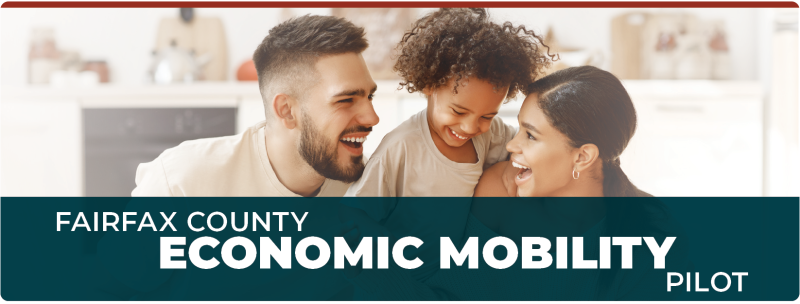
 The Fairfax County Economic Mobility Pilot (FCEMP) will provide monthly cash payments to eligible, randomly selected households, in addition to optional financial wellness support, to promote economic mobility and social capital. Fairfax County has designed the pilot to focus on ALICE, a United Way acronym for Asset Limited, Income Constrained, Employed population, that earn more than the Federal Poverty Level, but less than the basic cost of living for county/state in which they live. Funding for this program is provided by federal funds as part of the American Recovery Plan Act and supported also by the Fairfax County Human Services Council's Innovation Fund. The FCEMP includes three elements:
The Fairfax County Economic Mobility Pilot (FCEMP) will provide monthly cash payments to eligible, randomly selected households, in addition to optional financial wellness support, to promote economic mobility and social capital. Fairfax County has designed the pilot to focus on ALICE, a United Way acronym for Asset Limited, Income Constrained, Employed population, that earn more than the Federal Poverty Level, but less than the basic cost of living for county/state in which they live. Funding for this program is provided by federal funds as part of the American Recovery Plan Act and supported also by the Fairfax County Human Services Council's Innovation Fund. The FCEMP includes three elements:
- A monthly payment of $750 to 180 eligible, randomly selected families for 15 months;
- Freedom of choice for the families to use the cash as they deem necessary; and
- Optional financial wellness supports and the opportunity to increase their social networks through virtual or in-person events.
The application period for this program has closed.
- Fairfax County randomly selected 180 eligible families to participate in the pilot for 18 months.
- Cash disbursements were made from October 2023 through March 2025 (includes a 3-month extension).
- The payment stage has concluded; however, the research portion will continue through the end of 2025.
- There are no current plans to continue the pilot.


 The 2023 Fairfax County Economic Mobility Pilot (FCEMP) application information such as eligibility requirements, application and frequently asked questions and marketing materials used during the pilot are available online.
The 2023 Fairfax County Economic Mobility Pilot (FCEMP) application information such as eligibility requirements, application and frequently asked questions and marketing materials used during the pilot are available online.